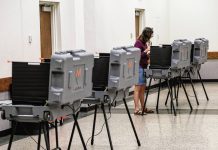EDINBURGH — If the district’s referendum doesn’t pass, Edinburgh Community Schools could be forced to consolidate.
This primary election, voters in Johnson County’s Blue River Township and Bartholomew County’s German Township are asked to raise their own taxes in exchange for raising teacher salaries and giving the school district a more secure future, said Ron Ross, superintendent. The school district has proposed a tax increase of about 40%, from about $1.06 for every $100 of assessed value to about $1.45.
District residents with a home valued at the district median of $96,800 would pay about $120 more per year, and those with a home valued at $200,000 would pay about $381 more. Considered on a monthly basis, that’s $9.97 a month or $31.77 a month for a $200,000 home. The figures are estimates from Baker Tilly, LLP, a Chicago-based public accounting and consulting firm that is working with the district on the referendum project.
The need for a referendum comes as the district is in the midst of declining student population, which is down almost 10% since the 2015-16 school year. That has resulted in about $600,000 fewer state dollars, which is the equivalent of 10 first-year teacher salaries and benefits, Ross said in February, when the district’s school board unanimously approved putting the referendum on the ballot.
The revenue loss has affected teacher salaries. State law now requires all Indiana full-time teachers to be paid at least $40,000 a year, Edinburgh schools would not have been able to meet that requirement without additional financial assistance it received from the state of Indiana to boost salaries, Ross said. Some Edinburgh teachers had been making several thousand dollars below the new state minimum before this year, according to salary data from Indiana Gateway.
The tax increase would allow the district to do more to make teacher salaries more competitive, Ross said.
“We also have been unable to give raises for so many years in a row that the salary scale has become compacted,” he said. “This means that teachers who have different years of experience are making the same amount of money. Our overall intention is to become more competitive with our staff salaries and work to resolve the salary compaction issue.”
The referendum would also raise salaries for non-teaching staff, go toward purchasing additional school buses and hiring more bus drivers. Money would also go toward increasing security at building entrances, upgrading security cameras and adding stop arm cameras to school buses, Ross said.
The bus issue is another key need. Right now, the district cannot bus all of its students to school, so parents outside the bus route have to drive their kids to school, Ross said.
Ahead of the election, school officials have held two community meetings, made phone calls to registered voters and distributed yard signs and mailers. Community members formed a political action committee, “Vote Yes for ECSC,” and administrators added information about the referendum and its possible impact to the Edinburgh schools website. So far, there is reason to be optimistic, Ross said.
“We feel very good about where we are,” Ross said. “The vast majority of people that we have spoken to are in support of the referendum. We have had several people pledge their support and request a yard sign. We will have over 100 yard signs in the ground this week. We have been making calls and sending mailers. We will be canvassing the community in the coming weeks. Our outreach efforts in general have been very well received. We will be increasing our efforts between now and May 3.”
If the referendum doesn’t pass, the school district will not be able to keep salaries competitive, which will result in staff members leaving. Edinburgh schools will continue not being able to bus all its students, and that, combined with the loss of qualified staff members, will result in a continued decrease in student enrollment, loss of money from the state, and in half a decade, possible closure of Edinburgh schools, Ross said.
“The school provides a sense of unity and community pride. Our athletic events are packed at every home event with faithful Lancer fans. The loss of our school means no more Friday night lights. We will lose local control of our school district and a voice in what happens to our students. If Edinburgh loses its school, the town will suffer as a result. People will relocate closer to where their students attend school. They will no longer frequent the local businesses, churches (and) parks. Property values will plummet.”
If more than half of voters approve the measure, however, none of that will happen, Ross said.
“Approving our referendum ensures that we retain local control of our schools, avoid consolidation, protect our community and property values, and ensure that the school and its programs remain a central source for community unity and pride,” Ross said.





